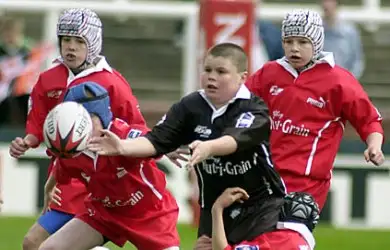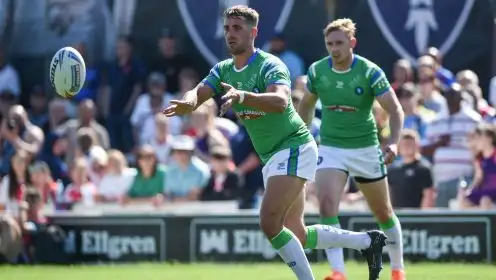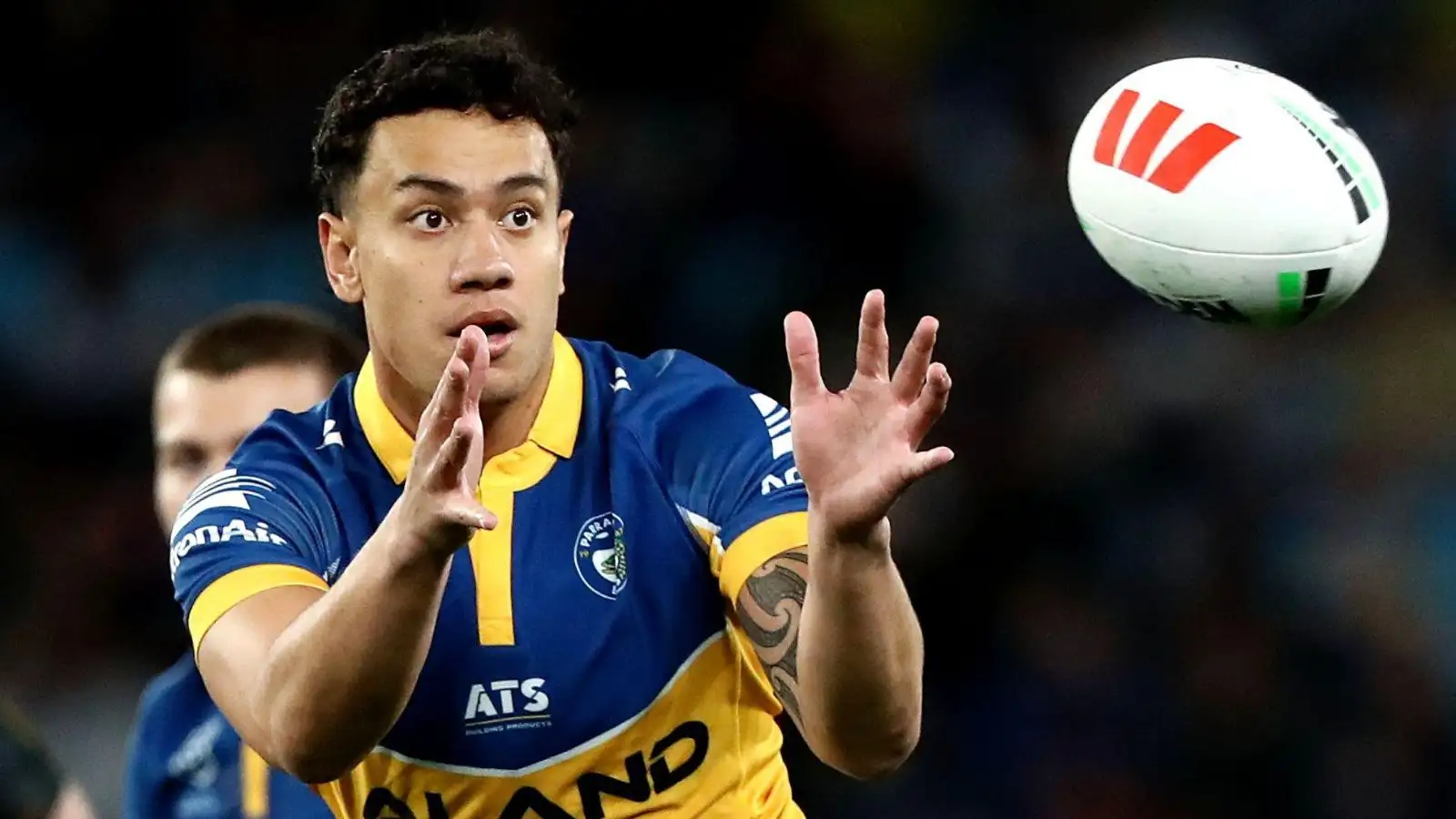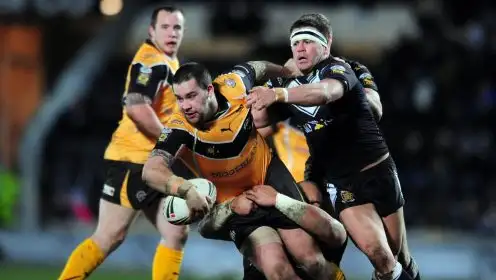Rugby League Week #7 – Reaction to Sport England cuts

Well, this week’s column was going to be a nice quiet affair about how we are essentially a quarter-way through the first chunk of league’s #NewEra.
An ideal time then to assess whether this most critical of seasons is playing out how everyone with the game’s best interests at heart would like it to be. But then into the Forty-20 in-tray drops a press release that even Leeds Rhinos’ media department would struggle to put a positive spin on.
“New projects to benefit from diverted sports funding,” it read, its sender Sport England having a bit of a go at looking on the bright side anyway. “Share of governing body money to be diverted to fund other projects in their sports.”
In short, swimming, rugby league, gymnastics and horse riding will between them see £1.53 million removed from their coffers for failing to meet targets agreed with Sport England in 2013-14. “Every penny of the money, a mixture of National Lottery and government funding intended to get more people playing sport, will be reinvested in alternative projects to explore new ways of producing better results in those sports,” the report continued.
To that extent, then, it wasn’t really bad news at all. The £573,133 ‘lost’ to rugby league – representing ten per cent of remaining funding to be used to help persuade more people to play the game – would remain in the sport. It would be simply removed from the governing body’s wallet and invested in community projects that use local club facilities and staff instead.
Nor would red-faced Red Hall be left entirely on the outer. Sport England will “work alongside” the RFL as the new projects are delivered by Super League clubs “or larger professional club foundations which can demonstrate a good track record of delivery.” Discussions with whom will start immediately.
No one, though, could miss the damning implications for the reputation of an organization that is seldom backward in coming forward to remind everyone that everything in its garden is rosy. The RFL would be involved in the rollout “to ensure the projects have maximum impact” and to help inform their wider work. In other words, Sport England no longer has faith that the Rugby Football League can be left entirely to its own devices in this area.
It could of course be claimed – and no doubt will be claimed – that the targets in question were simply set too high. And I would have more sympathy for that explanation were it not the case that, thanks to its often mind-boggling penchant for non-stop ‘positive’ spin, the RFL is now hoist with its own petard.
But following on from an earlier Sport England cutback (a reduction of £12million in 2013 for missing thirteen targets) the sign of a participation strategy in disarray is impossible to miss. Red Hall can put as many feelgood stories about increasing numbers of people taking up Touch RL the length and breadth of the UK all it likes, the boys and girls in control of Sport England’s funding purse strings are calling their bluff. Goodness only knows how much will be left in the pot come the next four-year cycle when, from 2017, knives further sharpened by economic austerity will doubtless cut even deeper.
The days when former RFL boss Richard Lewis chaired that public body between 2009 and 2012, when its largesse rained down from all sides and rugby league development officers worked busily away in just about every English region helped by funds of £29million, seem as distant as the three-point try.
Again, there is an extent to which a lot of this is out of the RFL’s control. Social trends play a large part in determining how many folk at any one time derive fun from being battered on a park pitch in Featherstone every weekend. And as we appear to be getting softer (some might say wiser) as a nation, it might even make sense to focus ever more scant resources on less demanding forms of what has always been an extremely tough sport.
Then again, it could also be claimed that in taking this tack the RFL has moved too far away from what rugby league actually is. A skillful, yes, but at times brutal and tribal sport that, like boxing say, acts as a responsible and even useful outlet for aggression that might otherwise be channeled in socially damaging ways. It gives focus to the communities in which it has, over the past 120 years, put down roots. It serves in many instances to give those communities identity. It keeps people fit and engaged, not only physically but mentally too.
And, by the way, that need not be an exclusive geographical thing. Wherever in the world you find rugby league taking root – the full-on tackling version – you’ll find the very same phenomenon. The benefits of teamwork and fellow feeling inspired by the sport spill out (and rarely violently) onto the touchline and into a wider community that has inevitably developed around it.
The decision to divert the RFL funding was taken by the Sport England board following, it says: “…detailed analysis of results in the latest Active People Survey, which is the contractual measure agreed with governing bodies to judge their performance.” Representatives of each governing body gave evidence at meetings with senior staff and board members to account for their performance in the last year and explain what plans they have in place to improve in 2015.
“Sometimes we need to take tough decisions to protect our much needed investment in grassroots sport,” said Sport England chief executive, Jennie Price. “ Today is one of those times. We invest significant sums of money in national governing bodies of sport to get more people active. But we can’t ignore falling numbers and missed targets where we believe there is scope for improvement, and in those circumstances we will divert money to projects that we believe will have more impact.”
She goes on: “The latest results show that some sports are moving in the right direction with more people playing every week. I’m in no doubt that this is because of the high priority those governing bodies are giving to grassroots sport, and the quality of the work they are doing.”
Which will make uncomfortable reading for those nominally in charge of rugby league for sure. Yet there is a bigger issue at stake here too, and one that takes us back to the original intended theme of this week’s column.
It surrounds politics: a subject never too far from the surface in rugby league; and of course leadership and, where necessary, culpability.
The fact that Super League clubs themselves will henceforth be responsible for driving at least some participation projects rather than the RFL is a timely reminder, perhaps coincidentally, of continued tensions within the sport’s corridors of power. Tensions that will only decrease with a sustained rise in top-flight attendances, more high profile media exposure and an all-round healthier financial picture from the Mersey to the Humber and beyond.
In the administrative arena, as elsewhere, so much depends on the new era’s success, the signs for which, particularly in the Championship, have thus far been moderately encouraging. The games have on the whole been competitive. Unpredictability of outcome is in place. Last year’s relegated Super League teams are by no means having it all their own way. Crowd figures, by and large, are at worst static, some rising. Issues however do remain – this is rugby league, there will always be issues – and of course the final verdict won’t be in until October.
Yet it seems undeniable to this writer at least that we are in any case seeing seismic shifts in the balance of power – from Yorkshire to Lancashire.
Many of the RFL’s brightest young things, particularly in its marketing and promotional departments, nowadays commute to MediaCity Salford. Only this week, northern PR firm Manc Frank, based in Manchester, became the sport’s first retained agency charged with managing communications. Along with promoting events like the Magic Weekend and Summer Bash, Manc Frank will also support individual players and clubs, we are told.
At times in recent years it has looked to some as if Rhinos boss Gary Hetherington has had the RFL board on a string, pulling them this way and that, as it suited his aims. Things are never so simple and though no one would deny Hetherington’s skills as a masterful manipulator, the impression does not prove the fact. He has always seemed to me to be a decent man of talent and vision with the best interests of rugby league at heart. Yet who could deny that the three (with Dr Koukash, perhaps four) most influential Super League figures now are the ones who own St Helens, Wigan and Warrington Wolves, with support on the flanks from a couple of shooters-from-the-hip in Hull?
And as a leaf through this month’s Forty-20 will reveal, it is in Warrington where one intriguing new arrival has just begun to push his feet under the table.
Welcome to rugby league Roger Draper, former boss of the Lawn Tennis Association, mover and shaker in the reconstruction of Wembley Stadium and – aye, aye, what’s this – one time chief executive of Sport England.
Word is that the #NewEra has been given three years in which to not just establish but prove itself as a profitable way forward. Which would seem to me to be just the right amount of time for a chap from outside the game to don his track suit, settle in, take a look around and get used to the lie of the land.
Meanwhile, on the outskirts of Leeds… hark! Is that the roar of dinosaurs? Big hitters beneath whom ground once secure is finally shifting?
Tone’s Tips: Victories for Warrington, Leeds, Castleford, Hull, Huddersfield and Widnes. Zak Hardaker to be announced as new host of ‘Top Gear’.



